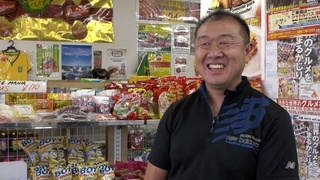Interviews
Identity (Japanese)
(Japanese) You know, well, I look back now on those times and… you know how people talk about their motherland, or homeland, right? Well, let’s see, of course that has to be my six, seven years spent in the US—the six or seven years after being born there, right? But then I went to Japan, and went through elementary and junior high school there. So there’s this, you know, the education, the environment that I grew up in and such [in Japan]. So actually, if asked whether identify myself as American or Japanese—at the time, I’d have to say that I saw myself as Japanese, and didn’t consciously identify as being an American.
…It’s called dual-citizenship—I had both American citizenship and Japanese citizenship. So the Japanese would say to me, “You’re American,” but since coming to Japan and living here, I felt, and my mother likewise felt, that we would never really be going “back” to America. I think we had a stronger feeling toward completely identifying ourselves as Japanese.
Date: June 17, 2008
Location: California, US
Interviewer: Yoko Nishimura
Contributed by: Watase Media Arts Center, Japanese American National Museum
Explore More Videos

The difference between Nikkei community in Oizumi and Brazil (Japanese)
(b. 1979) Sansei Nikkei Brazilian who lives in Oizumi-machi in Gunma prefecture. He runs his own design studio.

Advantages of living in Japan (Portuguese)
(b. 1962) Japanese Brazilian owner of a Brazilian products store in Japan.

More government supports in the city of Oizumi for Japanese Brazilians (Portuguese)
(b. 1962) Japanese Brazilian owner of a Brazilian products store in Japan.

Future of the Japanese Brazilian community in Japan (Portuguese)
(b. 1962) Japanese Brazilian owner of a Brazilian products store in Japan.

Unique Identity from Having Multiple Backgrounds
(b. 1938) Philipines-born hikiagesha who later migrated to the United States.

Growing up Japanese in Hawaii
(b. 1952) Former banking executive, born in Hawaii



Parents identification as Peruvian Okinawan
Okinawan American whose parents are from Peru.

Okinawan cultural appreciation
Okinawan American whose parents are from Peru.

Prejudice against Okinawans from mainland folks
Okinawan American whose parents are from Peru.

American values she aligns with
Okinawan American whose parents are from Peru.

Working together in Okinawa using three languages
Okinawan American whose parents are from Peru.

Expressing herself through poetry
(b. 1923) Japanese American poet, activist

About Escobar (Spanish)
(b. 1962) Nisei Japanese Argentinian, currently residing in Japan
